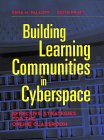|
Teacher Feature...
The Asphalt Classroom
by Royce Gough
"A wonderful harmony arises from joining together the seemingly unconnected." - Heraclitus c.500 BC
I can see it in their eyes. I imagine you can too. You know the look. The one that says, "I'm here for class… my brain is empty… please, fill it quickly so I can get out of here and get on with my life." Perhaps it's the last remnant of the tabula rasa philosophy (John Locke's 'blank slate'). Perhaps it's just years of miseducation, or maybe, just maybe, in our academic world, we don't really have time for students to learn.
Over the past decade the attention of many in academia has been turned to the cyber-world as a new educational venue. With the advent of the Internet, there are currently an estimated 505 million people online, which is expected to top 700 million by 2003 (Global Reach, 2002). Millions of people are online seeking information, reading, interacting, learning. This unprecedented access to information has created an interesting opportunity for educators.
The question shouldn't be, "Why aren't these people learning in 'real' f2f classrooms?" The question should be, "How can I get my classroom, my subject matter, to where these people are 'really' learning?"
Picture this: a classroom that is always open, everywhere, and everyone is already there. In this classroom everyone has an opportunity to talk, everyone has a chance to be listened to. No questions go unheard if they are asked---and there's plenty of time to ask. There is an equal opportunity for everyone. It's an "inclusive learning community" in every sense of the term… a community that doesn't necessarily need a "Teacher" present in order to function properly.
Equality in the classroom, however, is a threat to current educational practices. Where does this leave the Teacher (with a big 'T')? What happens to the academic profession when Teachers are no longer there to impart knowledge? How does the Teacher then define their role if the aren't "teaching?" What if the "Teacher" is no longer necessary?
The truth of the matter is that the teacher (little "t") will always be necessary. The difference is that we have become so focused on the teaching practices of the "Teacher" that we have somehow overlooked the primary function of the "teacher." That is, the role of the teacher should be to encourage learning.
The purposeful changing of the "T" to "t" signifies a change in the role of the teacher, from "master" of the subject matter, to co-learner. This idea has been presented by Palloff & Pratt in their text, Building Learning Communities in Cyberspace, and also by Parker Palmer in his latest work, The Courage to Teach. Palmer writes, "This is a classroom in which teacher and student alike are focused on a great thing, a classroom in which the best features of teacher-and student-centered education are merged and transcended by putting not teacher, not student, but subject at the center of our attention." (Palmer, 1998) In short, we have come to know learning as an active process, one that increases in strength with individual practice and personal interaction with the subject. These are things that the online community does best.
Consider this picture: It's late, class just got out, and a group of students head en masse to the parking lot. You happen to be part of this group when someone asks about something that was mentioned in class. What follows is a lengthy discussion about personal opinion, the reading, and the lecture. Some of the group dissipates after a while, and some new members join…and eventually, you leave having learned something. Perhaps more---much more---than you learned an hour or so before.
Have you been there? I have. If it weren't for the parking lot, I'm not sure I would have successfully made it through many of my educational experiences. I wish my classroom could be more like that asphalt lot.
The truth is, it can be.
Resources:
Global Reach: Global Internet Statistics (1996-2002). Retrieved February 10, 2002 from: http://www.glreach.com/globstats/index.php3
Palloff, R. M., & Pratt, K. (1999). Building learning communities in cyberspace:
Effective strategies for the online classroom. San Francisco: Jossey-Bass.
Palmer, P. (1998). The Courage to Teach: Exploring the Inner Landscape of a Teacher's Life. San Francisco: Jossey-Bass.
Best Sellers

Building Learning Communities in Cyberspace-Effective Strategies for the Online Classroom
by Rena M. Palloff
$$32.00 from Amazon.com
More information

The Courage to Teach-Exploring the Inner Landscape of a Teacher's Life
by Parker J. Palmer
$16.76 from Amazon.com
More information

The Courage to Teach: A Guide for Reflection and Renewal
by Rachel C. Livsey, Parker J. Palmer
$8.00 from Amazon.com
More information

An Essay Concerning Human Understanding
by John Locke, Peter H. Nidditch (Editor)
$41.95 from Amazon.com
More information
| 
